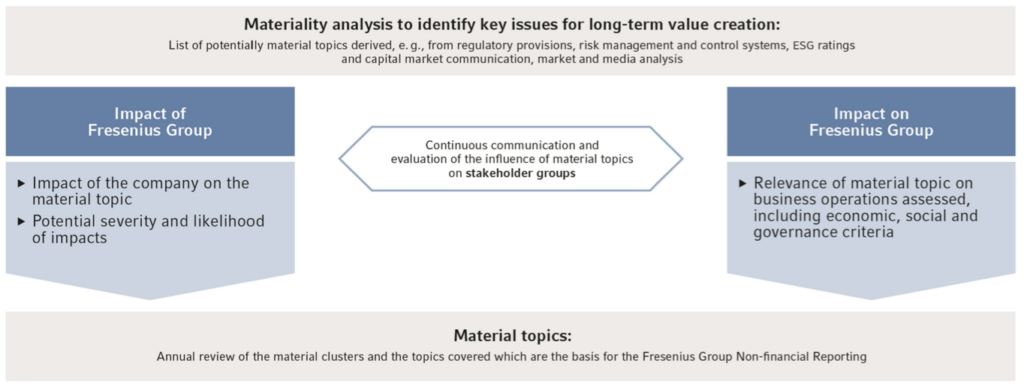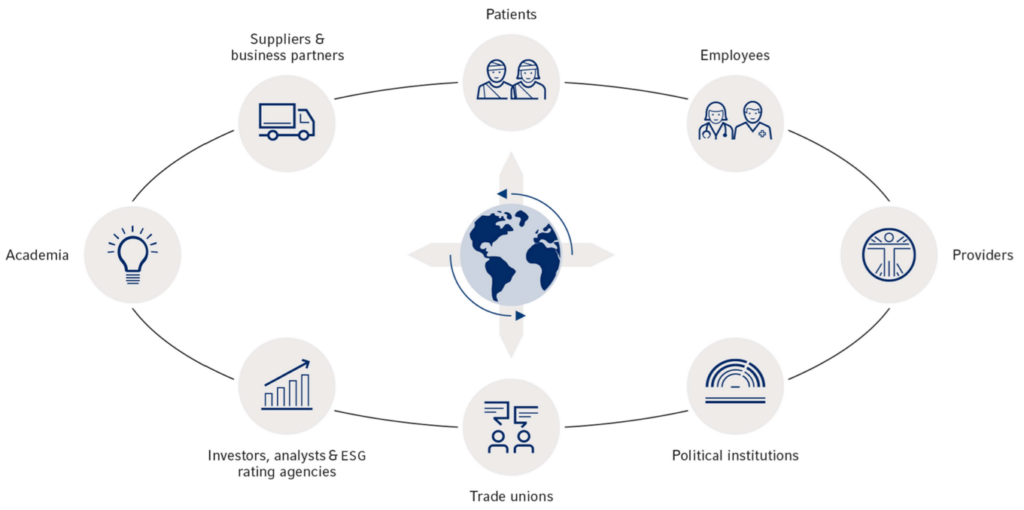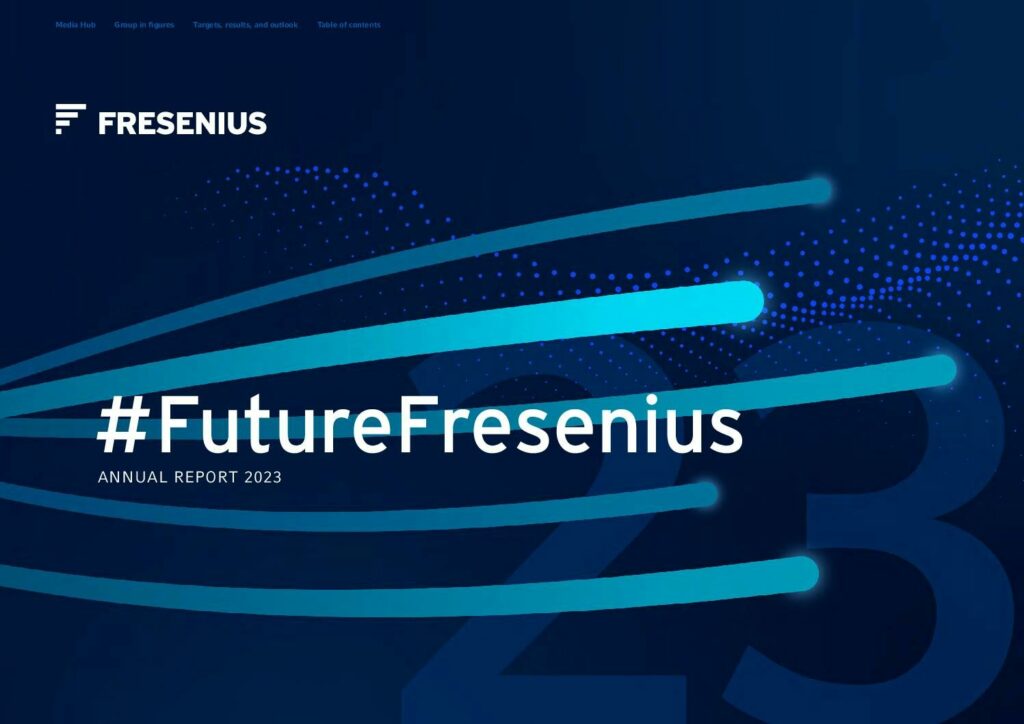Since 2017, we have been identifying the material topics for the Fresenius Group in a comprehensive materiality analysis. This is carried out every two to three years, depending on possible changes in the corporate structure and operating business performance. In addition, we review the material topics annually to ensure that they are up to date. Material are those aspects that are relevant for understanding Fresenius’ business performance, results of operations, and position, as well as for understanding the effects of its business activities on non-financial aspects.
We conducted our last comprehensive materiality analysis in the 2020 reporting year. A review was carried out in the reporting year. Based on the results of this review and the strategic changes initiated in the reporting year throughout the Group, the following changes have been made to the reporting: innovation and digital transformation are presented in separate chapters in order to highlight the strategic importance of both key topics and the respective governance approaches. The section on tax compliance has also been included in the reporting, and the chapters on human rights and supply chain have been summarized in the human rights chapter. However, these measures have not changed the fundamental process of identifying material topics. Rather, they confirm the effectiveness and improved transparency of the reporting.
Materiality Review

Material issues also include environmental issues, among others. We also take into account the results of our communication with our stakeholders, as described in the following section.
In the reporting year, a Group-wide project was initiated to implement the requirements of the Corporate Sustainability Reporting Directive (CSRD), with the aim of preparing the basis for non-financial reporting from 2024. Among other things, the project included a new materiality analysis based on the principle of double materiality to identify the material topics for the Fresenius Group. We will apply the results of the analysis to our non-financial reporting from the 2024 fiscal year. Based on the double materiality analysis, a gap analysis was conducted to identify the areas in which additional data and information must be collected in the future in order to fully meet the requirements of the CSRD. The projects required for data collection were launched in the reporting year. All relevant Group functions as well as departments at the business segment level are involved in the implementation.
Stakeholders and partnerships
Fresenius is involved in a diverse network of stakeholder groups. We gain valuable insights from this exchange, which we use to continuously develop the management of material topics as well as our reporting procedures. Our main stakeholders are presented in the graph below. Our exchange with political institutions and external organizations is focused on the fields of healthcare and patient care.
Stakeholders & Partnerships

In addition to these stakeholders, other third parties, such as patients’ families and professional groups related to our products and services, may also be important stakeholders in certain circumstances. To improve the readability of this report, we have refrained from listing all relevant stakeholder groups for individual topics and have used the term third parties as a collective term where appropriate.
Fresenius has signed the World Economic Forum's Zero Health Gaps Pledge ahead of the 2024 World Economic Forum in Davos. This commitment to promoting equal opportunities in healthcare is part of the Global Health Equity Network (GHEN), which brings together key players from the public and private sectors to advance a shared vision of equitable healthcare in line with the UN Sustainable Development Goals (SDGs). In early 2024, more than 80 companies have signed the world's first voluntary commitment of this kind. By signing the pledge, Fresenius commits to acting responsibly and working together for equal opportunities in healthcare.
Stakeholder dialog in all areas
We communicate with our stakeholders through various channels: Fresenius’ corporate functions focus on those that are relevant to the Group as a whole. The business segments are in active contact with patients, customers, and regulatory authorities, among others. In particular, Fresenius SE & Co. KGaA is in constant contact with investors and analysts due to its stock market listing and clarifies information requests. Further information can be found here.
We plan to expand our stakeholder outreach. For the reporting year, we again took into account the requirements of rating agencies and regulatory requirements. The specialist and corporate functions contributed the views of their respective stakeholders.
We submit information on emissions and water to the international non-profit organization CDP (Carbon Disclosure Project). At the request of some stakeholders, we also report ESG information in accordance with the TCFD (Task Force on Climate-related Financial Disclosures) reporting standard as well as an overview of material information and indicators in accordance with the requirements of the U.S. reporting standard SASB (Sustainability Accounting Standards Board). This additional information is not part of the Group Non-financial Report and its business audit, but is made available on the website with a time delay, latest in the second quarter of the following year.
Transparency in the healthcare sector
In the healthcare sector, transparency with regard to business conduct, patient information, and the quality of care is of great importance. Further information can be found in the Patient and product safety section.
Fresenius Group companies must comply with sector-specific laws and our ethical principles, which, for example, regulate the handling of payments to healthcare professionals and organizations, determine the disclosure of data from clinical or patient studies, or require transparency in pricing and reimbursement procedures for pharmaceutical products.
We undertake to comply with the codes and principles associated with membership of various associations. In addition, we disclose all benefits to healthcare professionals in the companies of the Fresenius Group in accordance with the disclosure requirements that apply to us.
Our work in associations and initiatives
Our employees contribute their expertise to national and international bodies, committees, and associations. In some cases, this is accompanied by industry agreements or commitments. The following initiatives and memberships are currently of particular strategic importance for the business segments:
- BAH – German Medicines Manufacturers Association, Member: Fresenius SE & Co. KGaA
- BVMed – Business Association of the Medical Technology Industry – Member: Fresenius SE & Co. KGaA, represented on the Board by Fresenius Kabi; voluntary commitment to comply with the Code of Conduct
- DAI – Deutsches Aktieninstitut – Member: Fresenius SE & Co. KGaA
- DIN – German Institute for Standardization – Member: Fresenius Kabi
- DIRK – German Investor Relations Association – Member: Fresenius SE & Co. KGaA
- ENHA – The European Nutrition for Health Alliance – Member: Fresenius Kabi
- IQM – Initiative Qualitätsmedizin – Founding and board member: Helios Germany; active management of expert committees; voluntary commitment to quality principles
- Medicine for Europe – Member: Fresenius Kabi; Commitment to the Code of Conduct
- MedTech Europe – Member: Fresenius SE & Co. KGaA; voluntary commitment to comply with the Code of Conduct
- Pro Generika – Member: Fresenius Kabi
- VCI – German Chemical Industry Association – Member: Fresenius SE & Co. KGaA
Further information about Fresenius memberships can be found on our website.
Contact
Fresenius SE & Co. KGaA
Group ESG
sustainability@fresenius.com







